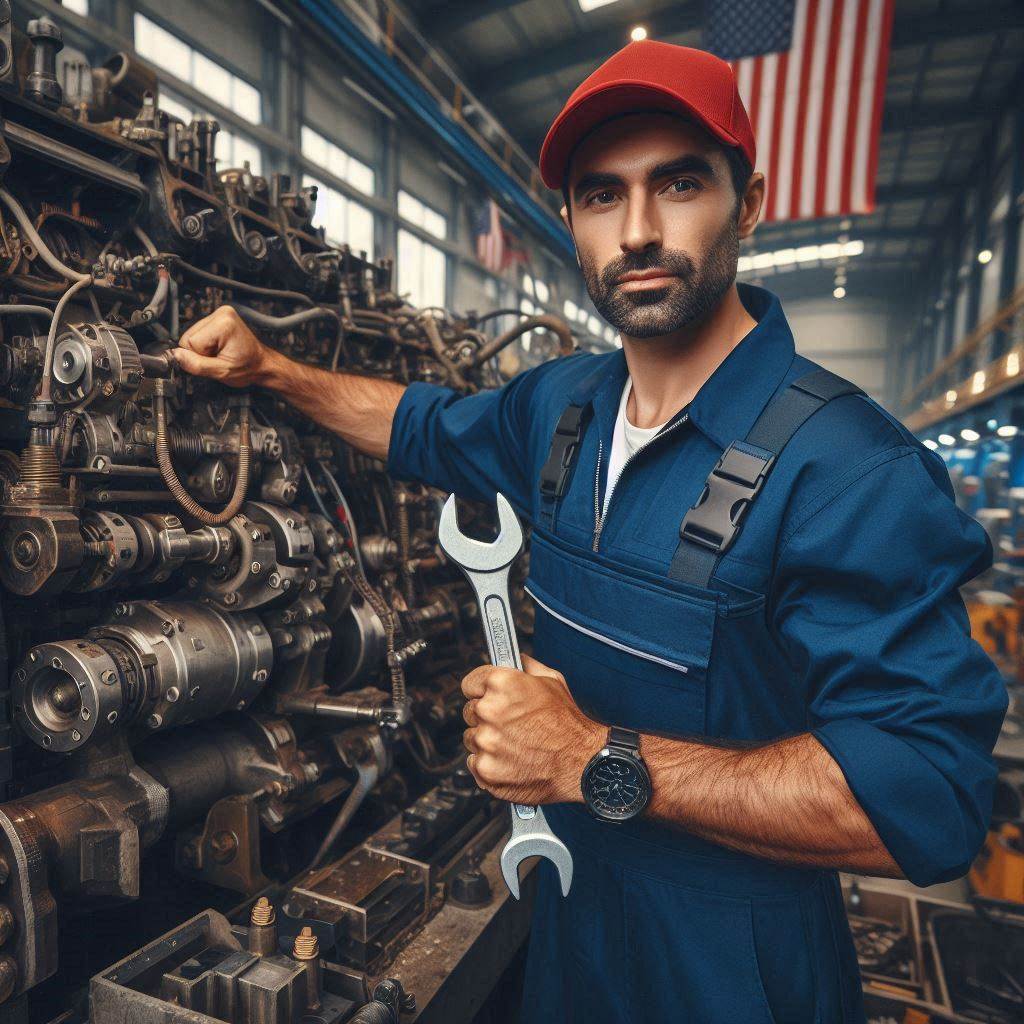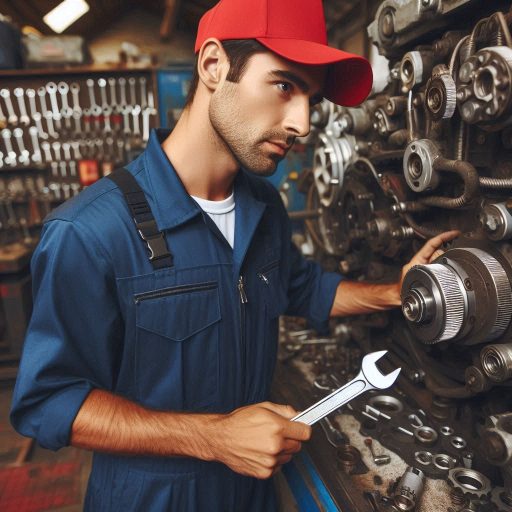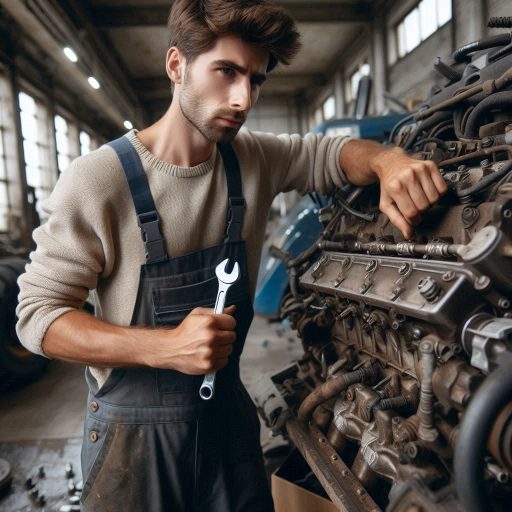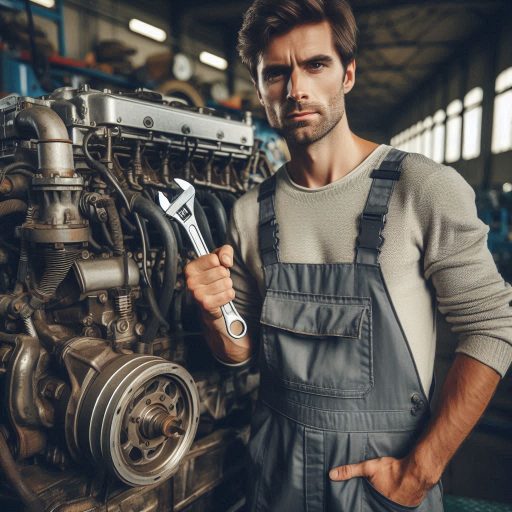Introduction
Industrial machinery mechanics are crucial in maintaining and repairing machinery across various industries.
They ensure equipment operates efficiently, preventing costly downtimes.
Their role involves diagnosing issues, performing repairs, and conducting routine maintenance.
Without these skilled professionals, industrial operations would face significant disruptions and inefficiencies.
The demand for skilled industrial machinery mechanics is high and growing.
Industries rely heavily on complex machinery, increasing the need for expert maintenance.
As technology advances, machinery becomes more sophisticated, creating a greater need for skilled technicians.
This demand translates into abundant job opportunities and job security for qualified mechanics.
Mechanics who excel in their roles can expect to see increased job stability and competitive salaries.
Employers seek mechanics with advanced skills and up-to-date knowledge, making specialized training and certifications highly valuable.
Staying current with technological advancements and industry trends will set you apart in a competitive job market.
Additionally, high demand means that industrial machinery mechanics have the potential for career advancement.
As experienced technicians gain expertise, they can move into supervisory or specialized roles, further increasing their earning potential.
Overall, the critical role of mechanics in ensuring smooth industrial operations, combined with a robust job market, highlights the value and opportunities available in this field.
Education and Training Requirements
The typical educational background needed to become an industrial machinery mechanic
To excel as an industrial machinery mechanic, start with a solid educational foundation.
A high school diploma is typically required for entry-level positions.
Courses in mathematics, physics, and shop mechanics provide a strong base.
These subjects help develop problem-solving and technical skills essential for the job.
Vocational training or technical education plays a crucial role in preparing for this career.
Many mechanics attend trade schools or community colleges.
These programs offer specialized training in machinery repair, electronics, and hydraulics.
Completing such a program enhances understanding of complex systems and improves job readiness.
The Importance of Hands-On Experience
Hands-on experience is invaluable in this field.
Apprenticeships and on-the-job training are critical for developing practical skills.
Many mechanics start as apprentices, learning from experienced professionals.
This real-world experience helps them understand machinery operations and troubleshooting techniques.
Working directly with machinery allows mechanics to apply theoretical knowledge in practical settings.
They gain familiarity with tools, safety procedures, and maintenance practices.
This experience is essential for building confidence and competence.
Employers highly value this practical background, as it reduces the need for extensive on-the-job training.
Continuous Learning and Staying Updated
The field of industrial machinery is constantly evolving with new technologies.
Continuous learning is crucial to stay current and excel in this career.
Mechanics should regularly seek opportunities for further education and certification.
Workshops, online courses, and industry seminars can provide updates on the latest advancements.
Staying informed about new machinery and technologies helps mechanics remain competitive.
It allows them to adapt to changing industry standards and innovations.
Mechanics who invest in ongoing education are more likely to advance their careers and tackle complex issues.
Employers appreciate mechanics who proactively update their skills.
This demonstrates a commitment to professional growth and excellence.
It also ensures that they can handle emerging technologies and maintain high performance.
Read: CAD Technician vs. Draftsman: Key Differences
Essential Skills and Qualities
Key Skills and Qualities for Excelling as an Industrial Machinery Mechanic
To excel as an industrial machinery mechanic, certain skills and qualities are essential.
Mastering these attributes ensures success and efficiency in the role.
Technical Expertise
Technical expertise is crucial for industrial machinery mechanics.
Understanding complex mechanical systems and their components is fundamental.
Mechanics must be skilled in diagnosing and repairing various machinery types.
Proficiency with tools and technology used in maintenance tasks is also vital.
Continuous learning about emerging technologies and advancements in machinery ensures that skills remain current.
Problem-Solving Skills
Problem-solving skills are indispensable for resolving mechanical issues.
Mechanics frequently encounter unexpected problems that require quick, effective solutions.
Analytical thinking helps in diagnosing the root causes of malfunctions.
Creativity often plays a role in developing innovative repair strategies.
Effective problem-solving minimizes downtime and maintains productivity in industrial operations.
Attention to Detail
Attention to detail is essential for industrial machinery mechanics.
Precision in both diagnosing issues and executing repairs prevents further damage.
Mechanics must carefully follow maintenance protocols and specifications to ensure machinery operates smoothly.
Small oversights can lead to significant malfunctions or safety hazards.
Being meticulous in every task enhances reliability and efficiency.
Importance of Organization, Reliability, and Safety
Organization
Being organized is crucial for managing multiple tasks and responsibilities effectively.
Keeping track of tools, parts, and schedules helps in completing repairs efficiently.
An organized workspace minimizes errors and enhances productivity.
Proper documentation of maintenance activities and repairs ensures that historical data is available for future reference.
Reliability
Reliability is a key trait for success as an industrial machinery mechanic.
Dependable mechanics ensure that machinery is serviced and repaired on time, preventing disruptions.
Reliability also builds trust with employers and colleagues, leading to a more collaborative work environment.
Consistently meeting deadlines and maintaining high standards of work is essential.
Safety-Consciousness
Safety-consciousness is paramount in the role of an industrial machinery mechanic.
Mechanics work with potentially hazardous equipment and materials.
Adhering to safety protocols and using personal protective equipment (PPE) prevents accidents and injuries.
Regular safety training and awareness help in maintaining a safe work environment.
Prioritizing safety not only protects the mechanic but also ensures the well-being of the entire team.
Read: CAD Technician Certification: What You Need to Know
Understanding Machinery and Equipment
Understanding Different Types of Machinery and Equipment
Excelling as an industrial machinery mechanic requires a thorough understanding of various types of machinery and equipment.
Each industrial setting uses different machines, from conveyor systems to hydraulic presses and CNC machines.
Knowing the specific functions and components of each machine is crucial.
This knowledge helps mechanics diagnose issues more accurately and perform repairs more effectively.
For instance, understanding how a pneumatic system operates differs from grasping the mechanics of a diesel engine.
Familiarity with the machinery in your workplace ensures that you can quickly address and resolve problems.
As machinery evolves, staying updated on new technologies and equipment is equally important.
Continued learning and training keep your skills relevant and sharp.
The Importance of Reading Technical Manuals, Blueprints, and Schematics
Reading technical manuals, blueprints, and schematics is essential for diagnosing and repairing machinery efficiently.
Technical manuals provide detailed information about a machine‘s components, operation, and maintenance procedures.
These manuals help you understand how different parts interact and what might cause a malfunction.
Blueprints and schematics offer visual representations of machinery layouts and electrical connections.
They guide you in tracing issues and understanding the machine‘s design.
Interpreting these documents accurately ensures that you follow proper repair procedures and avoid potential errors.
For instance, a schematic might reveal the exact location of a faulty wire or component.
Manuals often include troubleshooting sections that can pinpoint common problems and solutions.
By mastering the ability to read and use these documents, you enhance your problem-solving skills and reduce repair times.
This efficiency improves overall productivity and minimizes downtime in industrial settings.
Combining Knowledge of Machinery with Technical Documentation
Combining a deep understanding of machinery with the ability to read technical documents creates a powerful skill set.
When you know how different machines work and can interpret technical manuals and schematics, you become a more effective mechanic.
This combination allows you to quickly identify problems, make precise repairs, and ensure that machinery operates smoothly.
Moreover, familiarity with technical documentation helps in preventive maintenance.
You can perform regular checks and adjustments based on the guidelines provided in manuals.
This proactive approach reduces the likelihood of unexpected breakdowns and extends the lifespan of equipment.
By integrating these skills, you not only excel in your current role but also position yourself as a highly skilled professional in the field.
Understanding the types of machinery and effectively reading technical documents are critical to excelling as an industrial machinery mechanic.
These skills enhance your ability to diagnose and repair equipment efficiently, leading to improved performance and career advancement.
Read: Essential Skills for CAD Technicians

Safety Protocols and Regulations
The Significance of Following Safety Protocols and Regulations
Following safety protocols and regulations is crucial for industrial machinery mechanics to prevent accidents and injuries.
Adhering to these guidelines ensures a safe working environment and protects both workers and equipment.
Safety protocols are designed to minimize hazards and reduce the risk of workplace accidents.
Proper use of personal protective equipment (PPE) and adherence to safety procedures can prevent serious injuries.
Regular safety training and compliance with protocols help mechanics avoid common accidents, such as falls, electrical shocks, and machinery malfunctions.
By prioritizing safety, mechanics not only safeguard their well-being but also contribute to a more efficient and productive work environment.
Failing to follow safety guidelines can lead to costly accidents and legal issues for employers and employees alike.
Therefore, understanding and implementing safety protocols is essential for maintaining a safe and effective workplace.
Understanding OSHA Regulations and Best Practices
A strong understanding of OSHA (Occupational Safety and Health Administration) regulations is vital for industrial machinery mechanics.
OSHA sets standards that ensure workplace safety and health across various industries.
Mechanics must be familiar with OSHA guidelines to avoid compliance issues and ensure their work practices meet legal requirements.
Knowledge of OSHA regulations helps in identifying and mitigating potential hazards associated with machinery and equipment.
Mechanics should stay updated on OSHA standards as they can evolve with new safety insights and technological advancements.
Implementing best practices in workplace safety involves several key actions.
Mechanics should regularly inspect and maintain machinery to prevent malfunctions that could lead to accidents.
They must also ensure that all safety devices and guards are in place and functioning correctly.
Understanding lockout/tagout procedures is critical for safely performing maintenance tasks.
This process ensures that machinery is de-energized and cannot be accidentally started while repairs are underway.
Furthermore, mechanics should participate in ongoing safety training to stay current with industry standards and practices.
Knowledge of emergency procedures and first aid is also beneficial in responding effectively to accidents.
Proper documentation and reporting of safety incidents and near-misses are essential for improving workplace safety.
Mechanics should report any unsafe conditions or practices to their supervisors to address potential issues before they lead to accidents.
By fostering a culture of safety and continuous improvement, mechanics contribute to a safer work environment for everyone.
Emphasizing safety protocols and OSHA regulations not only prevents accidents but also enhances overall operational efficiency.
Read: Day in the Life of a CAD Technician
Transform Your Career Today
Unlock a personalized career strategy that drives real results. Get tailored advice and a roadmap designed just for you.
Start NowTroubleshooting and Problem-Solving
The Process of Troubleshooting Machinery Issues
Troubleshooting machinery issues requires a systematic approach to identify and diagnose problems effectively.
Start by gathering information about the machinery and its symptoms.
Listen carefully to any unusual noises or vibrations.
Check for error codes displayed on the control panel.
These initial observations can guide your diagnostic process.
Next, review the machine‘s maintenance history.
Look for recent repairs or any recurring issues.
This background information can provide clues about potential problems.
Verify that all machine components are properly installed and functioning.
Check for loose connections, worn-out parts, or leaks that might affect performance.
Use diagnostic tools to further investigate the issue.
Multimeters can measure electrical parameters, while pressure gauges assess fluid systems.
Use these tools to test specific components and identify faults.
Compare your findings with the machine‘s specifications and standards.
This helps confirm whether components are operating within acceptable limits.
Once you identify the problem, create a step-by-step plan to address it.
Start with the most likely causes based on your observations and diagnostics.
Replace or repair components as necessary, following the manufacturer‘s guidelines.
After making adjustments, test the machinery to ensure the problem is resolved.
Tips and Strategies for Effective Problem-Solving
Effective problem-solving involves breaking down complex issues into manageable steps.
Start by isolating the problem to determine which part of the machinery is malfunctioning.
Focus on one issue at a time to avoid confusion.
Document each step of your troubleshooting process to track what you have tested and what remains to be addressed.
Use a systematic approach to eliminate potential causes.
Follow a logical sequence, starting with the most common issues.
For instance, if a machine is not starting, check the power supply and connections before diving into more complex components.
Develop a troubleshooting checklist based on your experience and knowledge.
Include common problems and their solutions.
Refer to this checklist during diagnostics to ensure you cover all potential issues.
When dealing with complex problems, seek help if needed.
Consult with colleagues or industry experts who may have encountered similar issues.
Use online forums or manufacturer support resources for additional guidance.
Collaborating with others can provide new perspectives and solutions.
Maintaining and Improving Problem-Solving Skills
Continuously update your skills to stay proficient in troubleshooting.
Attend training sessions or workshops to learn about new technologies and diagnostic techniques.
Read industry publications to stay informed about emerging trends and best practices.
Practice troubleshooting regularly to enhance your skills.
Work on different types of machinery to broaden your experience and knowledge.
Reflect on past problems and solutions to improve your approach.
By following these strategies, you can excel in troubleshooting machinery issues effectively.
A methodical approach, coupled with continuous learning and collaboration, will enhance your problem-solving skills and ensure successful machinery maintenance.
Read: CAD Technician Salary: What to Expect in the USA
You Might Also Like: Differences Between Industrial and Systems Engineering
Maintenance and Preventive Care
Maintenance and preventive care are essential practices for ensuring the optimal performance and longevity of industrial machinery.
Regular maintenance involves routine tasks such as lubrication, calibration, and inspection to keep equipment running smoothly.
Preventive care focuses on identifying and addressing potential issues before they lead to significant problems or breakdowns.
By implementing a structured maintenance schedule and conducting periodic checks, technicians can detect wear and tear, replace worn parts, and make adjustments that prevent unexpected failures.
This proactive approach not only enhances the efficiency of machinery but also reduces the risk of costly downtimes and emergency repairs.
Through consistent maintenance and preventive measures, industries can maintain high levels of productivity and extend the lifespan of their equipment, ultimately contributing to a more reliable and cost-effective operation.
The Importance of Regular Maintenance and Preventive Care
Regular maintenance and preventive care are vital to prolonging the lifespan of machinery and preventing unexpected breakdowns.
Keeping machinery in optimal condition reduces the risk of sudden failures and costly repairs.
Regular maintenance helps identify potential issues before they become major problems.
Preventive care includes routine checks, lubrication, and cleaning, which keep components functioning smoothly.
Scheduled maintenance helps maintain the efficiency and safety of equipment, minimizing production downtime.
By adhering to maintenance schedules, you can avoid disruptions in operations and extend the life of machinery.
Effective preventive care ensures that machinery operates at peak performance, saving time and money in the long run.
The Role of Industrial Machinery Mechanics
Industrial machinery mechanics play a crucial role in creating maintenance schedules, inspecting equipment, and replacing worn-out parts.
Mechanics develop and implement maintenance schedules based on the manufacturer‘s recommendations and operational demands.
They ensure that routine inspections are conducted regularly, which helps in early detection of wear and tear.
During inspections, mechanics check for signs of damage, misalignment, or other issues that could affect machinery performance.
Replacing worn-out parts promptly is essential to prevent further damage and maintain operational efficiency.
Mechanics use their expertise to assess which components need replacement and perform the necessary repairs or adjustments.
Their hands-on approach ensures that machinery remains reliable and safe to operate.
By maintaining detailed records of inspections and repairs, mechanics can track equipment performance and make informed decisions about future maintenance needs.
Their proactive approach to maintenance and repair not only enhances machinery reliability but also contributes to overall productivity and safety in the workplace.
Communication and Collaboration
The Need For Effective Communication Skills
The Importance of Effective Communication Skills
Effective communication is crucial for industrial machinery mechanics.
Clear and concise interactions with team members, supervisors, and clients ensure smooth operations and problem-solving.
Mechanics must articulate issues and solutions precisely to avoid misunderstandings.
This clarity helps in efficiently addressing mechanical problems and implementing fixes.
When team members communicate effectively, they coordinate better and avoid redundant efforts.
Mechanic teams often face complex challenges that require collective input.
Therefore, maintaining open lines of communication is key to effective collaboration.
The Benefits Of Collaborating With Other Industrial Machinery Mechanics
Collaboration among industrial machinery mechanics enhances problem-solving capabilities.
Sharing insights and techniques with colleagues can lead to innovative solutions.
Teamwork allows mechanics to combine their unique skills and experience.
This collective knowledge often leads to faster and more effective repairs.
For instance, one mechanic might have expertise in electrical systems while another excels in hydraulic systems.
Together, they can address a wider range of issues.
This synergy improves the overall efficiency of maintenance and repair operations.
Working with Supervisors and Clients
Engaging with supervisors and clients effectively is equally important.
Supervisors rely on clear updates to make informed decisions.
Providing regular progress reports helps supervisors stay informed and manage resources effectively.
When mechanics communicate their needs and challenges, supervisors can offer timely support and guidance.
Similarly, clear communication with clients ensures that their expectations are met.
Mechanics should explain repairs, timelines, and potential issues transparently to build trust and avoid misunderstandings.
Sharing Knowledge and Best Practices
Mechanics benefit greatly from collaborating with other professionals in the field.
Sharing knowledge and best practices can enhance technical skills and problem-solving strategies.
Networking with other experts allows mechanics to learn new techniques and tools.
This continuous learning helps in staying updated with industry advancements.
Knowledge sharing also fosters a supportive work environment, where professionals can rely on each other for advice and support.
By working together, mechanics can solve complex issues more efficiently and effectively.
Building a Collaborative Environment
Creating a collaborative environment within a team leads to a more cohesive and productive workplace.
Encourage open discussions and team meetings to address challenges collectively.
Regularly sharing experiences and solutions helps in building a knowledge base that benefits everyone.
Mechanics who work well together can troubleshoot problems faster and more accurately.
This collaborative approach not only improves repair quality but also enhances job satisfaction.
A team that communicates effectively and shares knowledge will consistently achieve better results and maintain high operational standards.
Emphasizing effective communication skills and collaboration among industrial machinery mechanics is essential.
It enhances problem-solving, fosters knowledge sharing, and improves overall job performance.
Mechanics who excel in these areas contribute significantly to their teams’ success and operational efficiency.
Conclusion
Excelling as an industrial machinery mechanic requires a combination of skills and strategies.
Focus on developing technical expertise and hands-on experience with diverse machinery.
Master troubleshooting and repair techniques to handle complex issues efficiently.
Emphasize the importance of safety protocols to prevent accidents and ensure a secure work environment.
Stay updated on industry trends and technological advancements.
Regularly read industry publications and attend workshops to keep your knowledge current.
Embrace new technologies and learn how to work with advanced machinery, as this will keep you relevant and competitive.
Pursue opportunities for professional growth and advancement.
Consider obtaining certifications to validate your skills and enhance your career prospects.
Networking with other professionals can provide valuable insights and open doors to new job opportunities.
Seek out mentorship or training programs that offer guidance and additional learning.
Aspiring industrial machinery mechanics should continually hone their skills and adapt to evolving industry standards.
Stay curious and proactive in your learning journey.
By focusing on these key areas, you can advance your career, achieve success, and become a highly valued mechanic in the field.
[E-Books for Sale]
The Big Book of 500 High-Paying Jobs in America: Unlock Your Earning Potential
$19.99 • 500 High-Paying Jobs • 330 pages
Explore 500 high-paying jobs in America and learn how to boost your career, earn more, and achieve success!
See All 500 High-Paying Jobs of this E-Book
1001 Professions Without a Degree: High-Paying American Jobs You Can Start Now
$19.99 • 1001 Professions Without a Degree • 174 pages
Discover 1001 high-paying jobs without a degree! Unlock career tips, skills, and success strategies for just $19.99!




